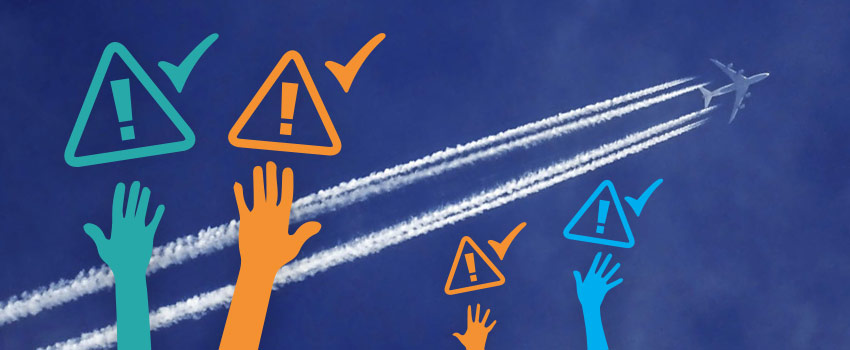The effectiveness of an airline’s safety management system (SMS) is often measured by the number of reports it receives, therefore, providing an environment and technology that encourages voluntary reporting is a critical dynamic in a fully functioning SMS. The problem some airlines face is how to develop such an approach when voluntary reporting has traditionally been low. Although a difficult thing to achieve, it is possible with appropriate management commitment and communication and it is acknowledged that the safest airlines in the world have a higher than average level of voluntary reports. One thing in common to all of these airlines is that safety is taken seriously at an enterprise-wide level.
A fundamental component of the ICAO Safety Management System architecture is Safety Risk Management. This process is underpinned by continuous hazard identification and reporting such that the safety team can complete risk assessments to determine if controls are necessary to mitigate risks to the operation to as low as reasonably practical.
If the SMS is to flourish in any organisation, it must be supported by a robust and effective reporting culture. This requires engagement of the entire workforce through the positive promotion of safety management such that all employees recognise their individual role in the maintenance of a safe operation. There are several factors that will support voluntary reporting in an airline organisation, although not all of them are easy to achieve. They can be categorised as follows:
- Enterprise-wide commitment to safety
- Adaptability and ability to learn from mistakes
- Awareness of what constitutes a hazard
- Safety-related behaviour
- Information distribution
- Trust and confidentiality
- Flexible and easy to use technology (online / offline)
See example situations in the voluntary reporting table taken from ICAO document 9859
First and foremost, in an airline organisation, is a Board’s complete commitment to safety as a primary strategic objective. It underpins everything from culture and reputation through to profit and consumer trust. A safety philosophy within an organisation creates both actual and unseen value.
Confidence and engagement
It is also imperative in an airline organisation that the workforce both understands its importance and believes that the corporate organisation takes it seriously. Therefore, for effective reporting an airline’s workforce must have confidence in the safety management system and in their own ability to influence a safe outcome by submitting voluntary reports no matter how trivial the subject matter may appear to be. Unless an organisation has engaged fully its workforce and has fostered a high degree of trust and confidence, it is unlikely that the volume of voluntary reports will be high.
In order for the safety risk management process to function, it is vital that the front-line staff are willing (and encouraged) to submit reports when they observe hazards (or potential hazards) to the operation. This is the only viable method by which management can obtain a thorough and complete overview of the hazard and risk landscape faced by their organisation. Without a robust reporting culture, the SMS will never reach full maturity and, in some cases, will be utterly ineffective.
Finally, any employee will want to know what has happened to their report. It is vital that feedback is made on initial submission and when the investigation is completed. Additionally, the employee should be able to monitor progress of their report through their individual home page in the reporting system. A good reporting culture relies upon a feedback mechanism that further engages the individual.
Technology and software support
Equally the technology in place must be developed to support and enhance the reporting process. As a minimum it should support and contribute to the safety management process in place, have both an online and offline capability, and be completely trusted by the workforce to provide confidentiality.
Such a vital element of the SMS should be evaluated on a regular basis to ensure that your organisational culture and management style are not having a negative effect on the amount of voluntary reports being submitted by your staff. When conducting such a review, the responses can be used to benchmark your organisation against positive and negative factors that influence your reporting culture (see ICAO table).
The table is divided into enabling and disabling factors that will influence your reporting culture. Most organisations will have characteristics that fall somewhere between the two extremes in the table and defining exactly where you lie will be a matter of subjective opinion (which could be enhanced by staff surveys if necessary). However, once completed, the management will at least have an indication of how their actions (or inactions) are affecting their reporting culture. Additionally, this will give an indication of what can be done over time to improve the situation.
Safety Promotion
As a final thought and another key component of the ICAO SMS is Safety Promotion. Obtaining safety reports from a workforce is often considered the first key aspect of an SMS yet, if there is not adequate safety promotion, then reports are likely to dry up. This means ensuring that the workforce is not only aware of what constitutes a hazard but, more importantly, is made aware of instances that can both educate the workforce further and enhance their understanding of what constitutes a valid safety report.
Finding and developing approaches that will support voluntary reporting lies at the heart of a good safety management system. At its root is a great safety culture but this must be supported and nurtured with user-friendly technology, incisive safety promotion and observance of ‘just culture’.
Learn how the right safety management software can help support and improve your airline's reporting culture. Download our free guide to find out more.
